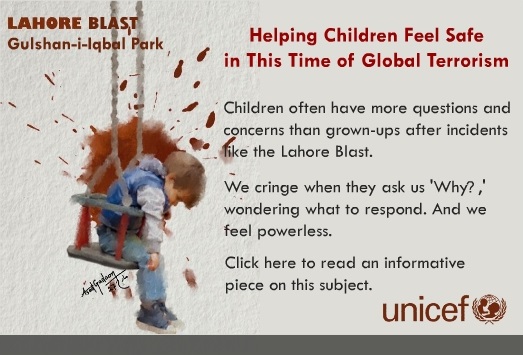Dr. Nancy Baron (Global Psycho-Social Initiatives)
Day by day, the media is filled with stories of terror across the globe. Adults are bombarded with the images on television, the sounds on the radio and the impact of reading the news. We struggle to understand who is doing this and why, while the faces of innocent victims haunt us. We risk having the numbers of innocent victims grow when our children watch us watch the news. We cringe when they ask us, “Why?” wondering what to respond, when we don’t understand and we feel powerless.
Theories about raising healthy children tell us that it is essential for children to feel safe and that it is the role of parents and family to provide them with that feeling of security. Yet, in this age of increased international terrorism many of us have begun to feel that ensuring our own security is not totally in our control. Importantly, parents need to regain their own sense of control so that they can provide that security for their children. The question is, “How to do this?”
First, parents can educate themselves and understand the issues of today. We can empower our selves and our children by becoming citizens of the world. Find activities to do with your children that promote peaceful existence at home, in your communities and globally.
Next, we can make proactive concrete plans for what to do in an emergency. Once we think through possible plans, then we can talk about them with our children. We need to speak honestly and not try to create a false security; children are too smart for that. Imagine possible scenarios and walk through what to do with the children. Talking about how to stay calm, following
instructions, not behaving like a superhero and retaining ones’ courage are essential.
Talk to your child’s teacher about concrete plans for what to do if there is an emergency at school. Children may feel more assured if they see solidarity between parents and teachers so parents and teachers can meet together with the children to discuss these plans.
It is impossible to imagine any child without some exposure to world events. Yet, not all children want to talk at length about these issues. Some children might not know how to verbalize their concerns or might hesitate to ask. Regardless of whether or not they mention issues of safety, parents should discuss it. Discussion will lead to the whole family joining together in a plan for
safety.
Open communication is an important key to intimacy. We each have our own limits as to how much we want to share about our feelings, thoughts and experiences. Sometimes parents and their children have different thresholds. We need to open the door to communication and let it be safe for children to share what they want, when they want. Knowing that this communication is
available, also leads to a child’s sense of security.
It is essential to educate children about world issues. Children need to learn to respect differences in culture and understand the values of compromise, conflict resolution, negotiation and most importantly peaceful coexistence. Television news, radio and newspapers are NOT targeting children’s education. Rather, they are often sensationally prepared to get the attention of adults. Parents, not the media, need to direct children’s learning. Parents can vary a child’s intake of news based on their age and maturity. Avoiding world issues is not the answer, educating, talking, explaining, debating, discussing is. A 5-year old recently told me, “War is bad because people get killed.” She’s right and it is important that she knows this.
Key points for how parents can promote feelings of security in their children and prepare them to be world citizens:
1. Educate your self; understand the issues of today.
2. Join your children in activities that promote peaceful coexistence.
3. Set up concrete plans with your family for how to manage emergencies at home, in the community or at your children’s schools.
4. Create an atmosphere of open communication in your family.
5. Choose some key global issues that you believe are essential for your children to learn and make a plan for how you will educate your children.
6. Select the news media your children can see, hear or read!
We cannot guarantee that bad things will not happen to us, our children or the world around us. However, being proactive through learning, thinking, talking, planning and activities with our children will promote family intimacy and maximize our capacity for security.
Source: UNICEF



